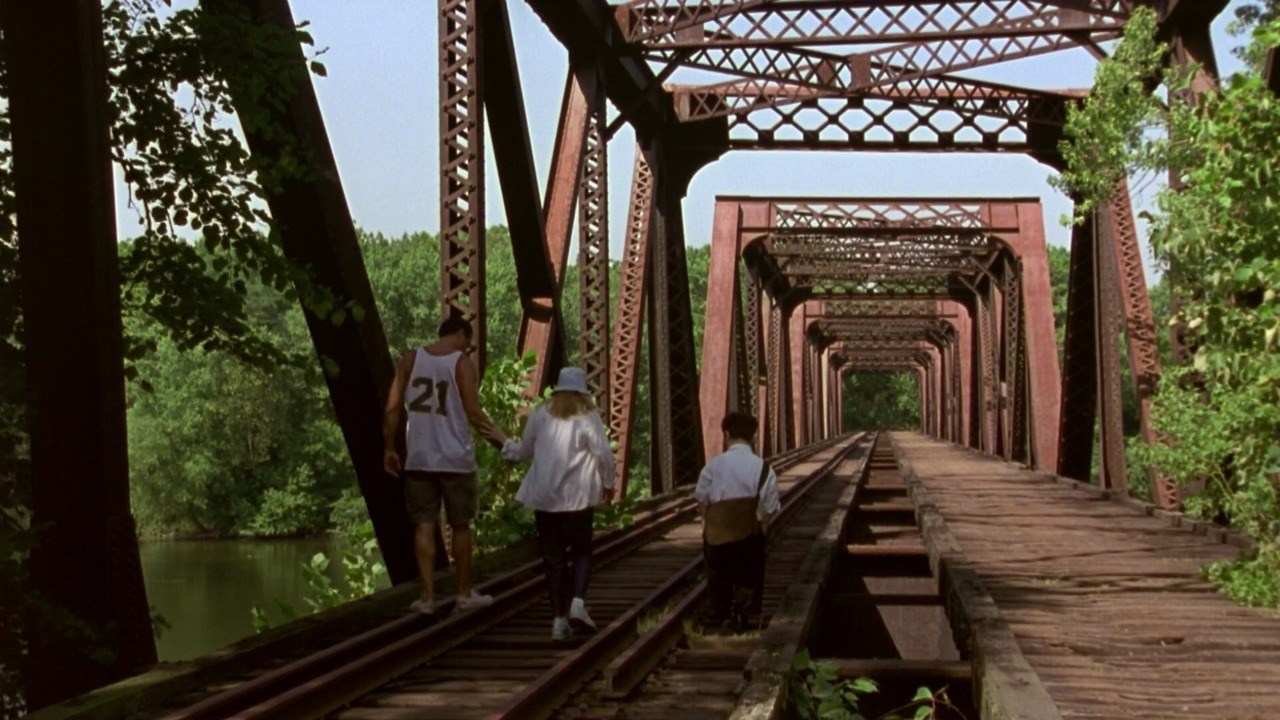You try walking across Seattle alone. At night. Barefoot.
My college roommate did all the time. I didn't understand it, just as I didn’t understand his quiet demeanor, his watchfulness from the edges, or his aversion to typical college-life distractions. His after-dark disappearances intrigued me. So I took to walking with him. I wore hiking boots, and still I struggled to match his incredible stride. As I did, my own pace—in walking and in living—permanently changed. I came to value the rewards of adventures off the beaten path, of being quiet in good company. And I found a compassionate friend.
I think of Michael when I watch Tom McCarthy’s large-hearted 2003 comedy The Station Agent.
And I watch it frequently. I see myself in Joe: the talkative food-truck barista (Bobby Cannavale) who sets up shop next to an obsolete train depot in Middle-of-Nowhere, New Jersey. I think of Michael when I watch Fin (Peter Dinklage): a soft-spoken loner who moves into that depot for the solitude, and who eventually surrenders, accepting Joe’s gregarious, uninvited companionship.
It’s remarkable: Watch how Joe and Fin, like an oversized puppy playing with Grumpy Cat, become complementary. Watch how they transform one other through the simple, shared experience of long walks and short silences.
How might the world be changed if we went strolling, in quiet attentiveness, with those we would rather avoid?
My comparison of my roommate and Fin only goes so far. I don’t know where Michael’s quiet nature came from, but it’s obvious what made Fin so disinclined to talk with anybody: He’s been mocked, abused, and avoided for his dwarfism. He has every reason to withdraw from society, to forget himself in a solitary pursuit—namely, train watching. (Does he love trains because they spend so much time in unpopulated regions of the map?) I cringe, seeing myself in the way some people avoid Fin, someone they don’t understand. I hope I’m not so insensitive as those who stare, who mock, who take snapshots as if he’s a rare animal who escaped the circus.
But I also cringe at Joe’s irrepressible flamboyance, the way he imposes himself on Fin’s silent retreat; the way his vocabulary knows no filter (he’s the movie’s R-rated element); the way he insists on saying grace over a meal in company that would rather not. And yet, as I observe Joe’s pain over his own personal affliction—a family crisis—I find his weaknesses endearing.
How might the world be changed if we went strolling, in quiet attentiveness, with those we would rather avoid?
These two eccentrics aren’t alone: There’s also Olivia (Patricia Clarkson, at her best) an artist who drives the way she behaves, careening all over the place, and who walks like she’s wearing high heels through an earthquake. Olivia relies on prescription medication to cope with a harrowing loss. Olivia needs Joe and Fin. The local librarian, Emily (Michelle Williams), needs friends too, if she’s going to escape her boyfriend’s cruelty. And Cleo (Raven Goodwin)—it’s not hard to guess why this little girl plays all by herself down beside the railroad.
One by one, five suffering souls are drawn together by a magnetic need for wholeness that can be found in a makeshift family.
I don’t know if my roommate was lonely. In a way, Michael was like Joe—he knew himself, and he did what he loved, regardless of others’ reactions. But in other ways, he was like Fin, who, being slow to speak, quick to observe, and committed to walking, drew me—and eventually others—off the beaten path to discover worlds the rest of us overlook.
This, my favorite film from director Tom McCarthy (who made the Oscar-winning Spotlight), is the film I’d nominate as my favorite “love your neighbor” story. It’s the DVD in my home film library that I loan out the most. It makes me want to take Joe-sized risks, to introduce myself to (and say grace with) total strangers, to be a friend to someone on the edges of things, not out of charity, but out of curiosity. I might find hurt and I might find a blessing. Sometimes, they’re the same thing.
I recommend The Station Agent for moviegoers ages 17 and up. It is currently available on DVD and on various streaming platforms, including iTunes, Amazon, Google Play, YouTube, and Vudu.
Questions to Discuss and Consider:
1. At the opening of the movie, we meet Fin and Henry. Theirs is an unusual friendship. Why do you think they understand one another?
2. Fin works at The Golden Spike, a model-train hobby shop, next to a salon called “Scissorhands Salon.” The salon has a bright red awning, like it wants our attention. Might this be a deliberate allusion to another film? Is there any thematic similarity between Fin’s experience of life and that of Edward Scissorhands?
3. Fin. Joe. Olivia. Cleo. How do they complement one another? What is it about their personalities that makes the time they spend together a life-changing development?
4. Trace the evolution of Joe’s curiosity about train-watching. What does he think of it at first? What does he think of it later? How and why does this change occur?
5. How does Fin change over the course of his developing relationships?
6. Talk about the centrality of trains and railroads in this film, and Fin’s preoccupation with the role of trains in American history. What does this have to do with his own life and experience? Why do they appeal to him?
7. Who do you know that draws you out of your routines and expands your world? When was the last time you spent some time with them?
8. How is the time that Joe, Fin, and Oliva spend together different from “community outreach” efforts and the tactics of typical evangelism? How do they gain one another’s trust? How do they reach a point where they are ready to listen to one another and help each other through hard times?
9. When was the last time you invited someone you don’t know very well to join you for a sightseeing walk? Who might you call up today and get to know better?
10. Have you noticed anyone—at work, at church, in the neighborhood—who seems disconnected or friendless? What might happen if you introduced yourself? (Before you presume that you can change their lives, get ready—they just might change yours.)
Jeffrey Overstreet is the author of Through a Screen Darkly and Auralia’s Colors. He has an MFA in creative writing from Seattle Pacific University, where he now teaches writing. He also teaches a film-and-apologetics course for Houston Baptist University. He has been writing about art, film, and faith for more than a decade at LookingCloser.org.








